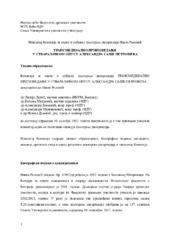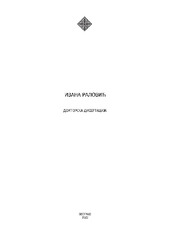| dc.contributor.advisor | Даковић, др Невена | |
| dc.contributor.other | Делић, др Лидија | |
| dc.contributor.other | Митровић, др Биљана | |
| dc.contributor.other | Јанковић, др Александар | |
| dc.contributor.other | Миловановић, др Александра | |
| dc.creator | Раловић, Ивана | |
| dc.date.accessioned | 2022-10-14T08:33:25Z | |
| dc.date.available | 2022-10-14T08:33:25Z | |
| dc.date.issued | 2023-03-10 | |
| dc.date.submitted | 2022-10-14 | |
| dc.identifier.uri | http://eteze.arts.bg.ac.rs/handle/123456789/581 | |
| dc.description.abstract | The creativity of Aleksandar Saša Petrović is multifaceted and fundamentally oriented towards a constant dialogue with literature, therefore at the core of this work he found himself as the keeper of the stories that have already been told, as the author who started from the material that has already been shaped, as a successful artistic or literary work and he translated such material into other media, reshaped it and adjust-ed it according to the characteristics of the new media and his own artistic aspirations. The corpus of the research consists of the following works from the opus: the films Three (Три) (1965), It Rains in My Village (Биће скоро пропаст света, нек пропадне није штета) (1969), The Master and Margarita (Мајстор и Маргарита) (1972), Group Portrait with a Lady (Групни портрет с дамом) (1977) and Migrations (Сеобе) (1994); TV series of Migrations (ТВ серија Сеобе) (1994); theatre plays Dog’s Heart (Псеће срце) (1979) and Master and Margarita (Мајстор и Маргарита) (1982), scripts for feature films Banović Strahinja (The Hawk) inspired by the epic folk song and Benjie the King (Бења Краљ) inspired by the short stories of Isaac Babel; The Purple Island (Пурпурно острво) as an adaptation of Mikhail Bulgakov's dramatic pamphlet of the same name, and synopses from the legacy of The Summer Vacation (Летовање) and the hitherto unpublished Odyssey (Одисеј) and the The Red Orchestra (Црвени оркестар).
The analyzed works from Aleksandar Petrović's opus are set: a) in the context of current and theoretically challenging problems of transmediality and adaptation; b) in a comparative relationship with the works translated into another medium, but also in the context of the relationship with the authors of the protoworlds, who are among the greats of domestic and world literature, c) in the cultural framework and viewed as an intertextual practice integrated with other linguistic forms (other and/ or previous films, literature, political zeitgeist, history).
Adaptations, transtextuality, quotation, transfiction, changing of the story world, which appear in the work of Aleksandar Saša Petrović in the process of transferring various literary templates to another medium, are here recognized as special types of transmedia storytelling. The paper explores Petrović's adaptations as a cultural translation and as a memory of what was read, enriched by the incorporation of the zeitgeist, the director's erudition, in the light of the broadly based theory of transmedia storytelling. | en |
| dc.description.abstract | Александра Саше Петровића окренуто је, вишеструко и суштински, сталном дијалогу са литературом, стога се у језгру овог рада нашао као чувар прича које су већ испричане, аутор који је полазио од грађе која је већ обликована, као успешно уметничко, књижевно дело и такву грађу преводио у друге медије, преобликовао и ускладио са њиховим законитостима и сопственим уметничким аспирацијама. Корпус истраживања чине следећа дела из опуса: филмови Три (1965), Биће скоро пропаст света, нек пропадне није штета (1969), Мајстор и Маргарита (1972), Групни портрет с дамом (1977) и Сеобе (1994); ТВ серија Сеобе (1994); позоришне представе Псеће срце (1979) и Мајстор и Маргарита (1982), сценарија за дугометражне игране филмове Бановић Страхиња (Соко) инспирисан народном песмом и Бења Краљ инспирисан кратким причама Исака Бабеља; Пурпурно острво као адаптација по истоименом драмском памфлету Михаила Булгакова, и синопсиси из заоставштине Летовање и до сада необјављивани Одисеј и Црвени оркестар.
Анализирана дела из опуса Александра Петровића постављена су: а) у контекст актуелних и теоријски изазовних проблема трансмедијалности и адаптације; б) у компаративни однос са делима која преводи у други медиј, али и у контекст односа са ауторима протосветова, који спадају међу великане домаће и светске литературе, в) у културни оквир и посматрани као интертекстуална пракса интегрисана са другим језичким облицима (другим и/или претходним филмовима, књижевношћу, политичким Zeitgeist-ом, историјом).
Адаптације, транстекстуалност, цитатност, трансфикција, промена света приче који се у опусу Александра Саше Петровића јављају у поступку преноса разноврсних литерарних предложака у други медиј, препознати су као особени видови трансмедијалног приповедања. Рад истражује Петровићеве адаптације као културно превођење и као сећање на прочитано обогаћено учитавањем духа доба, редитељеве ерудиције, у светлу широко постављене теорије трансмедијалног приповедања. | en |
| dc.language.iso | sc | en |
| dc.publisher | Универзитет уметности у Београду, Факултет драмских уметности | sr |
| dc.source | Факултет драмских уметности | sr |
| dc.subject | transmedia storytelling, transmediality, adaptation, literature, film, theatre, screenplay. | en |
| dc.subject | трансмедијално приповедање, трансмедијалност, адаптација, књижевност, филм, позориште, сценарио. | en |
| dc.title | ТРАНСМЕДИЈАЛНО ПРИПОВЕДАЊЕ У СТВАРАЛАЧКОМ ОПУСУ АЛЕКСАНДРА САШЕ ПЕТРОВИЋА | en |
| dc.type | doctoralThesis | en |


